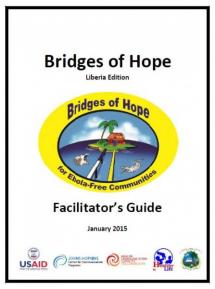Bridges of Hope Facilitator’s Guide
This is a training program for service providers and communication professionals working in Ebola-affected countries.
By the end of the training, participatants will:
- Be motivated to act in ways that help their community to become and remain healthy and Ebola-free
- Understand how Ebola is transmitted and how to minimize the risk of transmission
- Be able to identify symptoms that may indicate Ebola infection
- Understand what they can safely do to support someone who has Ebola symptoms to improve the person’s chances of survival
- Know what to do to ensure a safe burial if someone dies of Ebola
- Welcome and support Ebola survivors, recognizing that they pose no threat and, in fact, have a valuable role to play in helping to prevent and treat Ebola cases in their community
- Support and not sitgmatize those who have lost family members to Ebola
Source: Johns Hopkins University Center for Communication Programs
Date of Publication: March 25, 2019
SIMILIAR RESOURCES
Tools
Examples
- Community Communication MNCH e-Manual: Participatory Health Promotion Sessions
- Crisis and Outbreak Communication Pandemic Flu and Other Disasters
- How Should Community Health Workers in Fragile Contexts be Supported: Qualitative Evidence from Sierra Leone, Liberia and Democratic Republic of Congo
- The Facilitation Primer
- Template for Stakeholder Engagement Plan
- Stakeholder Analysis Matrix
- Stakeholder Interview Script
- Nutrition Social and Behavior Change Strategy Library
- Religious Leaders Play Key Role in Battle against COVID-19
- Translators without Borders Glossary for COVID-19

